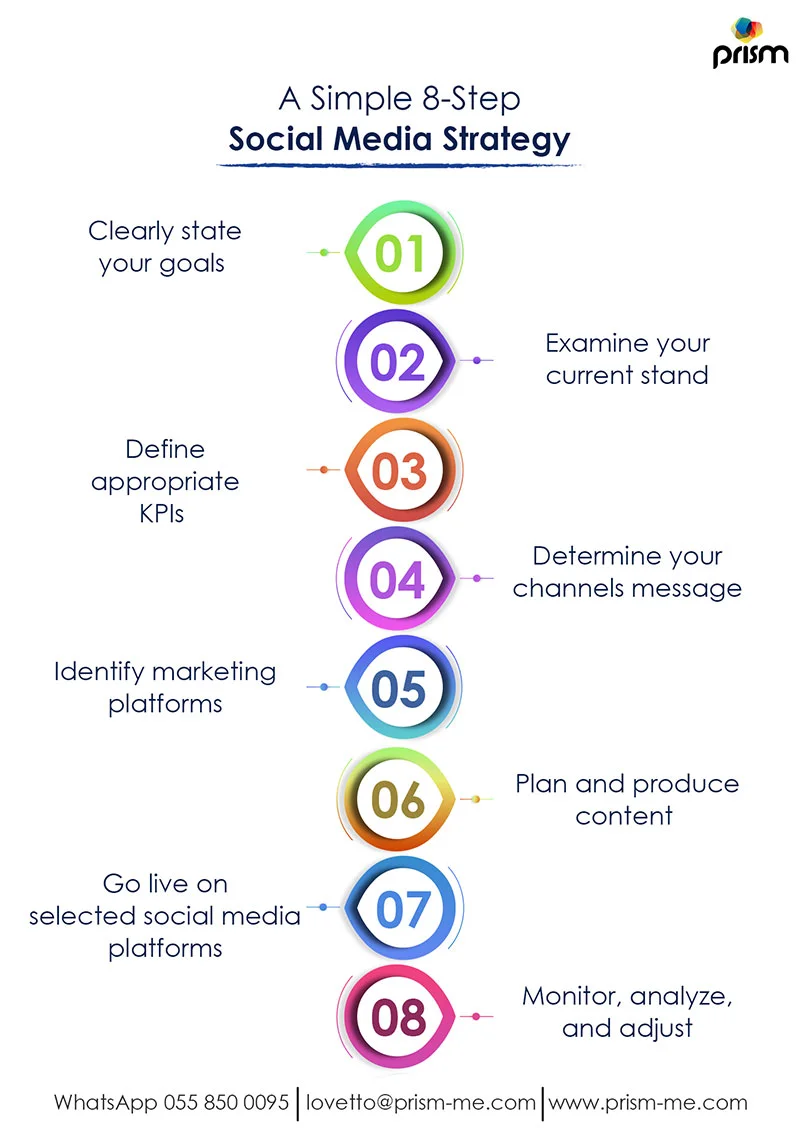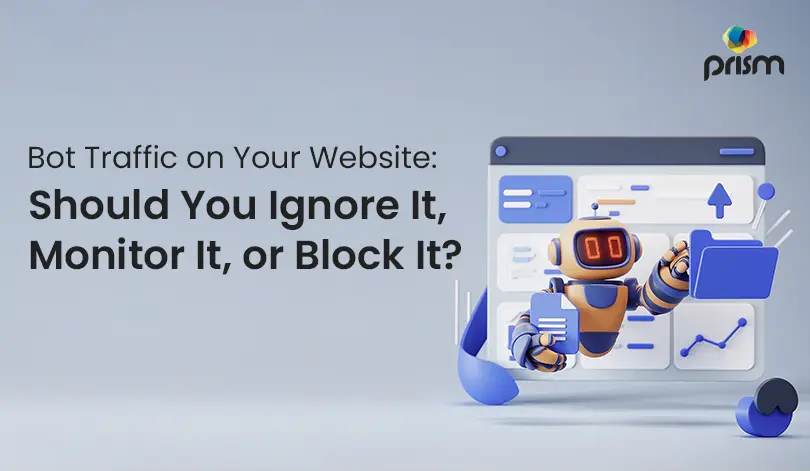

8 Steps To Developing A Successful Social Media Strategy

Clearly state your goals
You must sit down and clearly lay out your goals for using social media before you can move forward. Setting SMART goals here is appropriate:
S - Specific
Being explicit about your objectives while making goals is essential because it will make it much simpler to understand precisely what you're attempting to accomplish. Assign an aim, such as "grow Twitter followers to 10,000," rather than just saying that you want to "raise Twitter followers."
M - Measurable
For each goal you set, be sure you understand how you'll evaluate your success.
A- Achievable
With social media objectives, you should pick ones that are difficult but still feasible.
R - Relevant
Social media marketing is most effective when it is in line with the other aims and objectives of your company, so make sure your social media objectives contribute to the overarching mission of your company.
T- Timely
When defining goals, be sure to include a deadline to hold everyone accountable. An excellent method to make sure you're on track is to include specific milestones along the route.
Examine where you are right now
You must thoroughly understand how your current social media platforms are doing before you can begin developing your updated strategy. This will allow you to identify exactly where and how you need to make improvements. This process has the following steps:
Your current development and outcomes
To ensure that you know exactly what you're auditing, you must first identify all of your social media platforms, channels, and handles and write them out in a list. Next, take a look at each channel:
Which channels are best for what kinds of content?
What kinds of clients are you interacting with the most?
Which social media sites are bringing the most visitors to your website?
Similar to this, you must verify that your accounts are consistent across all platforms. It's all about presenting a united front so your customers can find and remember you, from making sure your handles are the same to using the appropriate logos, pictures, and tone of voice depending on the platform.
Competitor research
While it's fantastic to gauge your success based on your own development, it's equally important to understand how you stack up against your rivals in order to provide insights into the general trends in your sector and to identify any potential improvement areas.
Determine your competitors
If not, use Google or other keyword tools to look up the terms your consumers use to find your company and other people who are relevant in your field. You should already have a general understanding of who your competitors are. For the truest comparison, always only compare your social media strategy with companies who are also actively using social media.
Collecting data
You should find out which social media sites they use, how many followers they have, what kind of content they post, and whether or not they make use of any platform-specific features like Instagram Stories or Facebook Shopping. Additionally, you should consider their audience expansion, user interaction, and the kinds of hashtags and keywords they employ.
Examine their individual social media usage
As you analyze their behavior. How quickly do they respond to inquiries or comments? How frequently do they post, and when was their most recent post? You may get a much clearer view of your sector overall and learn what works and doesn't by carefully examining what they're writing about and how they conduct themselves on social media.
- Location
- Languages
- Interests
- Demographics
- Attitudes
Choose the appropriate KPIs and measurements
Although there are numerous metrics you can monitor, from lead generation to building online authority, the ones you do monitor will greatly differ depending on your aims. Here are a few instances:
You should monitor metrics like impressions, shares, post reach, follower growth, and brand mentions if you want to increase brand awareness.
Your website's traffic from social media sources, conversion rate, click-through rate, and bounce rate will all be factors to consider if your overall objective is to boost conversions.
You must monitor metrics like shares and retweets, brand mentions, audience growth rate, post engagement rate, and reaction rate if you want to use social media to create and manage an engaged community.

Define the main messages and goals for your channel
The decision of what material to produce, publish, and what important messages you want your target audience to take away from your social media channels may be made much easier if the goal of your social media channels is well defined. Here is an illustration of an online store:
Platform objectives:
LinkedIn: for offering longer-form material and thought leadership positioning that is beneficial to both organizations and individuals.
Twitter to interact and engage with others by sharing company and product updates as well as timely sector news.
Facebook is a great platform for engaging with your audience, giving out advice, and beginning discussions.
Instagram: for interacting with consumers, inspiring others, and increasing visibility.
Identify Your Marketing platforms
It can be tempting to try everything with your social media strategy to see what sticks, but it's much better to look at what's working for you and change your approach in accordance with that. You should have a broad understanding of your industry's landscape, where your customers spend their time, and the kinds of material they prefer to consume after conducting a competitor study. From there, you may choose precisely which social media channels you'll use. Although having an active presence on several platforms is great, there is no need to waste time on a place where you are aware that your audience is not there.
Planning and Producing content
Unfortunately, this is where most businesses start, but if you follow all of the previous steps first, you'll be able to ensure that the material you're producing is catered to your target market. Plan your social interactions as well as any measures you'll need to take to accomplish your objectives. Always keep your aims and audience in mind, whether you're producing video content or taking part in influencer marketing activities.
Video Content
It is extremely popular on social media, from Instagram Reels to Facebook Live. In actuality, marketers who use video increase revenue 49% faster than those who don't.
Written Social media posts
From text-only updates to LinkedIn articles, sharing company blogs, and summaries of webinars or events, written posts are ideal for educating your audience.
Infographics
They are a striking and convenient method to give your audience useful information.
Measure, watch, examine, and adjust
The secret to developing a great social presence is to keep track of your development. Even if you do all of your research, there are no guarantees when it comes to social media, therefore it's all about trying and revisiting. Your social media strategy should be dynamic, and it's crucial that you keep adjusting it to best serve your target audience and what functions for you.
If you want a team of professionals with specialized experience in social media management and the ability to develop a successful social media strategy for your brand, think about hiring a digital marketing agency like Prism Events Digital Advertising. Contact us right away.

About The Author: Lovetto Nazareth
Lovetto Nazareth is a digital marketing consultant and agency owner of Prism Digital. He has been in the advertising and digital marketing business for the last 2 decades and has managed thousands of campaigns and generated millions of dollars of new leads. He is an avid adventure sports enthusiast and a singer-songwriter. Follow him on social media on @Lovetto Nazareth
Post Your Comment!
Recent Blogs

Does AI Content Work for Search Engines? What Google Actually Rewards in 2026

Bot Traffic on Your Website: Should You Ignore It, Monitor It, or Block It?

GEO, AEO, LLMO vs SEO: New Strategy or Just Old Wine in a New AI Bottle?

Orphan Pages in SEO: Hidden Technical Issues and How to Fix Them

Support
Phone: +971 55 850 0095
Email: sales@prism-me.com
Location: Prism Digital Marketing Management LLC Latifa Tower, Office No. 604 - West Wing World Trade Center 1, Sheikh Zayed Road Dubai, UAE
Subscribe
Join our newsletter to stay up to date on features and releases.
By subscribing you agree to our Privacy Policy and provide consent to receive updates from our company.
